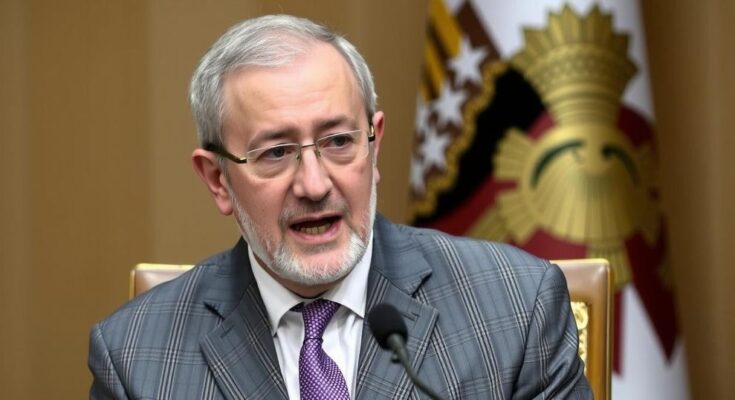Ahmad al-Sharaa, the de facto leader of Syria and head of Hayat Tahrir al-Sham (HTS), stated it may take four years to hold elections in Syria, requiring up to three years for a new constitution and a comprehensive population census. He emphasized the need for political dialogue among various factions and the reconstruction of infrastructure following decades of dictatorship. An Israeli airstrike in Damascus killed 11 people, focusing attention on ongoing regional conflicts.
Ahmad al-Sharaa, the de facto leader of Syria and head of Hayat Tahrir al-Sham (HTS), asserted in a recent interview that it may require up to four years for elections to take place in the country. He stated that crafting a new constitution could take up to three years and emphasized that valid elections necessitate conducting a comprehensive population census. Following the overthrow of former President Bashar Assad, al-Sharaa indicated the importance of establishing political dialogue among Syria’s various factions, a step deemed crucial after decades of authoritarian governance under the al-Assad regime. Furthermore, al-Sharaa mentioned the need to reconstruct the war-damaged infrastructure before elections can occur. He noted, “The chance we have today doesn’t come every five or 10 years,” highlighting the importance of stability and continuity for the new constitution. Al-Sharaa remains Syria’s leader until March 1, when factions are expected to convene to discuss the nation’s political future and transition to a government that unifies the country. He also revealed plans for HTS to dissolve after dominating the northwest enclave for several years.
In related developments, an Israeli airstrike occurred on the outskirts of Damascus, reportedly killing 11 individuals, mostly civilians. This attack targeted a weapons depot affiliated with Assad’s forces, continuing a long-standing Israeli strategy of countering threats from Iran-backed groups in Syria. While maintaining a critical stance toward Iran, al-Sharaa expressed a desire to sustain strong relations with Russia, acknowledging its pivotal role in supporting Assad’s regime during the conflict. He also reported ongoing negotiations with the Kurdish-led Syrian Democratic Forces, with hopes of their integration into Syria’s security framework amid persistent tensions with Turkish-backed factions in the region.
The current political landscape in Syria is complex, resulting from over a decade of civil war and subsequent power shifts. Ahmad al-Sharaa leads HTS, a prominent group that emerged during the insurgency against Bashar Assad. With the recent overthrow of Assad, the establishment of elections hinges on a new constitution and a census, amidst various factions seeking dialogue and national unity. The reconstruction of war-torn infrastructure also poses a significant challenge as Syria navigates its path toward a stable political future. Additionally, the ongoing Israeli airstrikes, aimed at countering Iranian influence, directly impact regional security dynamics.
In summary, Ahmad al-Sharaa’s remarks indicate a cautious but determined approach to rebuilding Syria’s political framework over the next few years. The emphasis on drafting a new constitution, conducting a census, and facilitating dialogue among rival factions is vital for restoring governance and stability. As the country moves forward, the resolution of external threats and reconstruction of infrastructure will be critical in shaping Syria’s future. Al-Sharaa’s strategic relationships, particularly with Russia, and efforts towards unification among disparate groups will significantly influence the country’s trajectory.
Original Source: www.euronews.com




